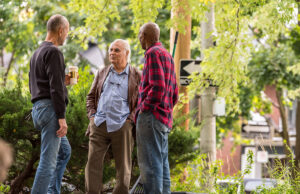Dan Levitt: If You Live Long Enough, Be Prepared for Age Discrimination
Dan Levitt, a board member of the Global Ageing Network and the Executive Director of Tabor Village shares his vision of what the aged care sector could look like if we were to embrace transformational reforms that challenge the way we view seniors.
I want to share with you my biggest fear. It keeps me awake at night. It is something that I have not written about, until now.
I have gerontophobia. I am afraid of getting old.
I fear that I will lose my memory, my physical strength and no longer be able to live independently. I dread the weight I will place on my family to care for me at home. I fear most that I will be forced to leave my home in the neighbourhood where I have lived all my life and have no choice but to live in an old age institution. I am scared that I will have to wait too long for admission to that nursing home, because not enough new residential care facilities will have been built, that the nursing home I move into will be chosen by the government not by me as a consumer as this basic right is not afforded to seniors who meet the eligibility criteria for residential care.
While I am waiting for placement, the limited hours of home care I receive will support only my medical needs and my physical, social, emotional, and spiritual needs will go unmet while my world collapses around me as I begin to be treated as a non-person. People will talk to me and not involve me in their blurry conversations about my ailing condition, my prognosis, which I no longer completely comprehend. I will become a domesticated patient living in my house that has become unrecognizable to me.
Once I am placed in a nursing home, I will spend most of the time in my bedroom watching television. When I press the nurse call button I will have to wait too long for help and be neglected leaving me in soiled incontinence pads resulting in me developing painful pressure ulcers. I may be the subject of resident-on-resident violence. I may be given anti-psychotic medications for a psychiatric illness that has not been diagnosed. I will lose connection to my family and friends who will visit infrequently.
I will lose weight appearing emaciated because my taste buds do not enjoy the bland overcooked food served from the hospital style cafeteria, food that is unrecognizable and pureed to ensure I do not choke. Nothing on the menu will be what my previous self-enjoyed eating. When my family complains about the food, they will find out that the facility is doing the best they can with $7.50 of funding per day for raw food. A prisoner to the choices of the dietician prescribed food, the only crime I have committed is being older, and for this, I am serving a life sentence.
What if we reinvented the aged care sector? What if we reimagined the aging journey? What if sleepless nights were filled with good dreams that might one day become a reality?
You don’t have to venture too far away from home to find examples that might just be the panacea we are all seeking. The sharing economy has created co-housing, pocket neighbourhoods, the village movement, and care doulas who help navigate seniors through an often fragmented aged care system.
Further afield, in Tokyo Japan, 10 centenarians with dementia live together in a group home where their daily choices include a minimum: 1,500 calories, 1.5 litres of their favourite beverage, walking exercises, and meaningful activities. Seniors are toilet retrained and no longer use incontinence pads, saving money while improving dignity, self-esteem, and quality of life. Physiotherapists mobilize seniors out of their wheelchairs who walk with assistive mobility aides.
In France, seniors move into nursing homes with time to adjust to their new home before dementia advances. Society has made longer lengths of stay an option for seniors requiring residential care as well as capping the amount people pay. The result is that seniors become accustomed to their environment. In Dijon, a senior spends his days in a workshop using a scroll saw independently with a hand guard to prevent injury. When it’s time for a break he ventures down to the bistro where he enjoys a glass of Burgundy wine, eats cured meats and unpasteurized cheeses, and crunches on buttery croissants.
In Sydney, Australia, a consumer-directed care bond program has created an aged care building boom. This renaissance gave birth to the Scalabrini dementia village, where Italian speaking staff monitor seniors using smart technology enabling residents to wander freely around the outdoor piazza complete with a statue fountain of Venus, Vespas, gelato stand, wood burning pizzeria and a roman catholic church adorned with stain glass and a clock tower.
Also in Sydney, some seniors prefer a different way of life. SummitCare focuses on hospitality by designing a hotel model residence. Traditional institutional design elements are eliminated: no handrails, no visible nurse call system, no uniforms, and no clothing protecting aprons. Couples choose to live together in a one bedroom apartment, where they sleep together!
It’s only ageism that tells us seniors are not interested in intimacy. Perhaps sex is the biggest older adult prejudice. The nursing home industry has perpetuated this anti-aging bias where government regulations do not allow couples one with dementia and one without dementia to live together in the same bedroom.
Without major transformational reforms to the aged care sector, seniors will continue to be in an untenable situation. Too many seniors to care for, too few trained staff and too little money because neither the government nor individuals want to pay more. Perhaps our culture is gerontophobic, viewing older adults as burdensome and disposable. Systemic discrimination is something to fear.
Are we willing to upset the status quo? We have done our best to eliminate racism and sexism. Are we, are you, ready to take on institutionalized ageism?
Dan Levitt is executive director of Tabor Village, a memory care home offering supportive housing to seniors with memory impairment, Alzheimer’s and dementia. He is also an adjunct professor of gerontology at Simon Fraser University and adjunct professor in the School of Nursing at the University of British Columbia. He is a board member of the Global Aging Network.
This article was published in the Vancouver Sun on April 27, 2018.

Recently Added
February 19, 2026
Statement to the United Nations: February 2026
January 22, 2026




